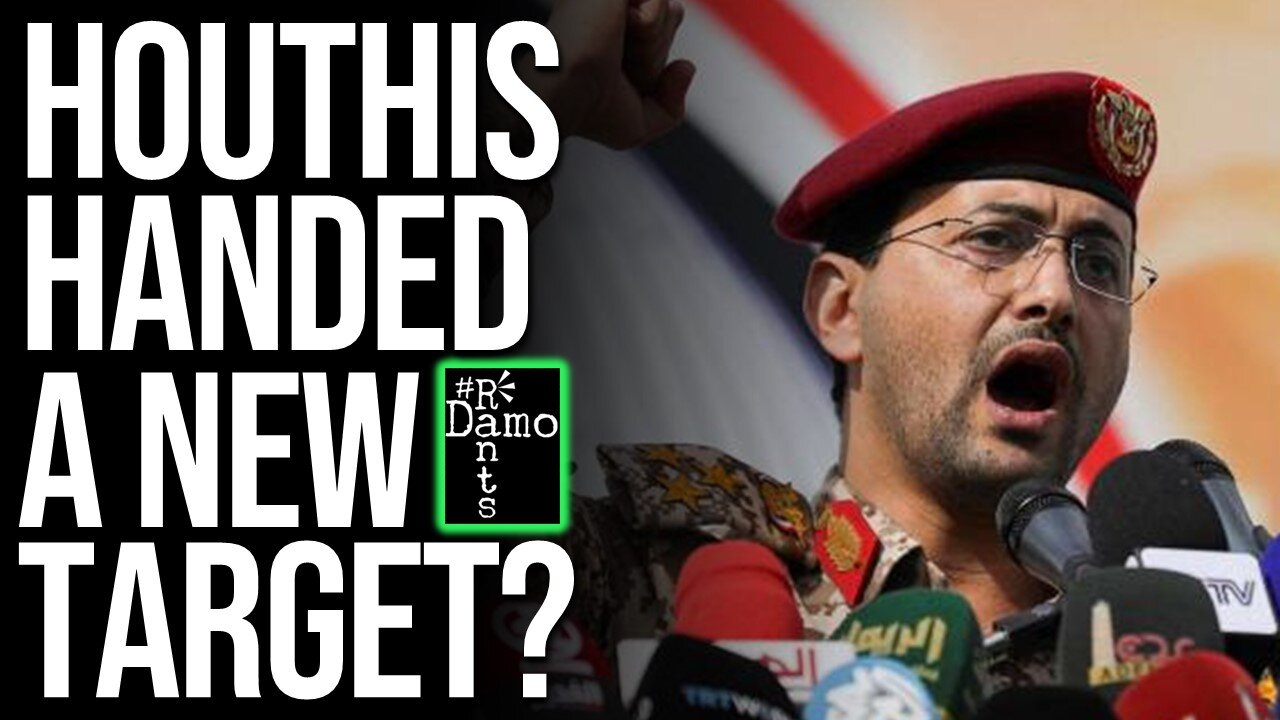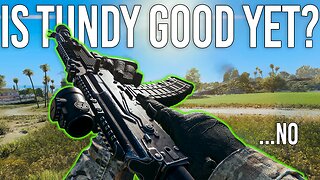Premium Only Content

Did The Houthis Just Secure A NEW MILITARY TARGET?
Right, so have the Houthis got their sights set on an all new target, because an all new target appears to have its sights set on them in a manner of speaking anyway.
I spoke about Somaliland, the internationally unrecognised breakaway bit of Somalia in a recent video when Donald Trump was weighing up his options for where he could deport the entire population of the Gaza Strip to, in what would be one of the most egregious examples of ethnic cleansing in history and all for no benefit to the US at all, all for the good of Israel as per usual. But now it has drawn attention again for another reason, once more involving Israel, but not directly, as it is the United Arab Emirates that are behind this, for Israel’s benefit yes, but also their own.
You see between Somaliland and Somalia there is another contested chunk of land called Puntland and it is here that an airport that the UAE uses to fly supplies and aid to paramilitaries in Sudan driving their civil war, but now a radar outpost has been established there, an Israeli built radar outpost being used by the UAE, to spy on the Houthis in order to give Israel a heads up on any attacks heading their way. Why would Puntland and Somaliland be party to this? The UAE are once again on the wrong side of history on two war fronts here and as for the Houthis, well, is this just a much closer target for them to strike?
Right, so the United Arab Emirates are apparently up to no good in Puntland, in between Somaliland and Somali on the Eastern Coast of Africa, the horn of Africa as its called, reinforcing an airbase there that the UAE use to aid the Rapid Support Forces in Sudan, the breakaway paramilitaries driving civil war in Sudan, whilst doing Benjamin Netanyahu a solid by being able to spy on the Houthis at the same time, giving Israel a potential heads up as rockets launched from Yemen head their way. It marks the UAE’s increasingly belligerent role on the world stage, the deployment of an Israeli-made radar system in Puntland—a move that directly links Abu Dhabi to Tel Aviv’s military efforts against the Houthis. As an Arab nation themselves, you’d figure the UAE would be showing more solidarity with other Arab nations and not with Israel, but having normalised relations with the genocidal blue and white state this is clearly not the case. This radar system is a deeply troubling symbol of the UAE’s ongoing betrayal of Arab solidarity, its role in regional destabilisation both in West Asia and East Africa, and its descent into becoming yet another pariah state in the Middle East.
The radar system that has been installed is the same kind used in Israel’s Iron Dome defence system and has been positioned near Bosaso Airport in Puntland. It will enable the UAE to monitor Houthi attacks across the Red Sea for the benefit of Israel as well as protecting its arms pipeline supplying the Rapid Support Forces, the RSF in Sudan through Bosaso. The UAE's choice to install Israeli technology on African soil, in a Muslim-majority region, taking advantage of its fractured geography and politics, is frankly sick given what Israel are doing, a move increasingly tilted towards Israel’s strategic interests, at the cost of Arab lives and further regional stability.
The timing of the radar installations existence becoming public knowledge is particularly notable as the Saudis and Emiratis have been allegedly involved in the planning of a ground assault on the Houthis.
The Houthis have already responded to such provocations with explicit warnings and that both Saudi Arabia and the UAE that they would pay a price should they engage in any renewed offensive against Yemen and in fairness both nations have backed off from this US led approach. But the UAE’s decision to mount an Israeli radar to monitor Houthi movements suggests a willingness to escalate tensions anyway, regardless of the human cost, even if it is in a less proactive manner.
Perhaps even more troubling is the radar system’s dual function, which matches the UAE’s dual destabilisation of territory – it’s not there just to track the movements of the Houthis but to safeguard the UAE's resupply route for the RSF in Sudan, thereby aiding and abetting in not just one genocide but two. Bosaso Airport has become a key logistics hub for shipping arms and supplies to the RSF, which is currently engaged in what multiple observers, including the United Nations, have described as genocidal campaigns in Sudan's Darfur region.
By protecting Bosaso from potential retaliatory attacks, the UAE is effectively ensuring that its proxy forces in Sudan continue receiving the material support they need to carry out ethnic cleansing operations unchecked there, whilst also serving Israeli interests via surveillance, effectively giving Israel a foothold in Africa. In doing so, Abu Dhabi not only acts in direct contradiction to its carefully cultivated image as a modern, Westernised power and hub for business, but reveals itself as a cynical, militarised state willing to enable atrocities for its own strategic gain too.
The radar installation was no spontaneous act of self-defence. It stems from secret negotiations between the UAE and Somaliland. These talks, facilitated by Emirati diplomats on Israel’s behalf, have included proposals for establishing an Israeli military base in Somaliland in exchange for future diplomatic recognition—recognition that Israel has long denied to Palestine but now dangles before Somaliland’s leaders like a poisoned carrot and directly reflects the same promise being made by Trump, speaking of poisoned carrots, if Somaliland agreed to take the Gazan population. An excerpt from The Cradle on this radar installation appearing and the deals done to put there reads:
‘The radar installation followed the RSF’s loss of most of Khartoum in early March and is seen as part of the UAE’s efforts to safeguard its operations in Puntland. One source suggested the radar might have been deployed as early as late 2024, although this has not been independently verified.
Somali national authorities have remained conspicuously silent about the UAE’s military presence. Puntland's President Said Abdullahi Deni allegedly authorized the UAE’s activities without approval from Somalia’s federal government or the Puntland parliament. Two Somali sources called it a “secret deal,” with even top Puntland officials unaware of its full scope.
The UAE has historically maintained deep ties with Puntland, training local forces and combating piracy. Deni’s close alignment with Abu Dhabi is widely seen as a political strategy to secure UAE backing for his potential bid in Somalia’s 2026 presidential elections.
Under Somali President Hassan Sheikh Mohamud, Mogadishu has opted for silence, likely to preserve Emirati support in the fight against the Somali extremist armed group, Al-Shabaab. Mohamud’s government faces rising security threats and political unrest, especially his controversial push to replace Somalia’s clan-based electoral system with universal suffrage.
The UAE’s parallel involvement in Somaliland, a breakaway state, has further strained relations. Somalia’s foreign minister recently urged the UAE to stop treating Somaliland’s leader as a head of state, reflecting growing tensions over Abu Dhabi’s expanding influence in the Horn of Africa.’
Such is the duplicity that underscores Israel and the UAE's growing willingness to exploit smaller, vulnerable states for their own aims. Somaliland’s desire for international legitimacy has rendered it a pawn i that endangers regional peace, undermines Somali sovereignty even as the UAE courts them as well, and props up apartheid and settler colonialism in Gaza and the West Bank by doing favours for Israel on top versus the Houthis.
It does also have to be asked of Somaliland what their game is here too, that they would now cooperate with the UAE and Israel—against the Houthis, against Palestinian solidarity, and in service of Israeli military expansion and is their broken statehood behind their decisions to do this, despite their very close proximity to Yemen, just the other side of the Gulf of Aden and the Bab-el Mandeb Strait as they are, no trouble at all to reach if the Houthis desire this.
The UAE's actions increasingly align it with the forces of regional repression and apartheid. Its crackdown on domestic dissent, where Emirati political dissidents have been rebranded as "terrorists" merely for advocating reform, mirrors its international policy of suppressing popular movements, crushing indigenous resistance, and collaborating with colonial regimes.
Far from being a beacon of modernity as the likes of Dubai and Abu Dhabi are regarded, the UAE is anything but, now risking becoming a more widely seen pariah state much like Israel for not only aiding Israel, but also the dissident forces in Sudan too. Abu Dhabi’s partnership with Tel Aviv in monitoring and attacking Arab resistance movements, supporting genocidal militias, and entrenching foreign military bases in fragile states like Somalia and Somaliland is vile in the extreme.
From a military standpoint, Israel gains significantly by having a foothold on the African mainland much closer to Yemen. The radar not only extends Israel’s surveillance capabilities but also provides early warning against Houthi missile and drone strikes, potentially saving Israeli and allied vessels in the Red Sea.
However, this presence also makes Somaliland—and by extension Somalia and Puntland—prime targets for Houthi retaliation should it come to it. The radar station, and any future Israeli military base, will undoubtedly be perceived by Ansar Allah as legitimate targets. Civilians in Puntland and Somaliland may now find themselves unwittingly placed in the crosshairs of a new front in Israeli and UAE instigated aggression.
The UAE, for its part, stands to benefit from tighter security over its Sudan supply routes and greater regional influence. Yet the risks are enormous: by backing Israel so openly, Abu Dhabi alienates itself further from Arab public opinion, inflames anti-Emirati sentiment among Yemenis and beyond, and exposes itself to a new wave of possible attacks from Houthi forces.
In aligning itself so brazenly with Israel’s military objectives, Abu Dhabi has effectively turned its back on the Arab world, sacrificed Palestinian solidarity, and enabling genocidal violence in Sudan to continue and not enough is being made of some of the depravity being exhibited by some states in the Middle East, especially those that are a bit further away from Israel and who benefit from significant wealth through Western ties like the UAE.
As the UAE deepens its ties to Israeli military interests though, it deserves to see some reputational damage for it, so it can be called out for what it is doing not just on one war front but two.
If this radar station has been operational for a while though, it’s not done that good a job going by recent Houthis strikes, because not only have the Houthis broken records in how far north in Gaza they are capable of reaching, but they are downing US drones at a faster rate than ever before! Get all the details of that story in this video recommendation here as your suggested next watch. Please do also hit like, share and subscribe if you haven’t already done so, so as to ensure you don’t miss out on all new content published daily, as well as supporting the channel at the same time, which is very much appreciated, holding power to account for ordinary working class people and I will hopefully catch you on the next vid. Cheers folks.
-
 30:53
30:53
BonginoReport
6 hours agoMonica Kelsey: The Woman Who Is Saving Countless Babies - Nightly Scroll w/ Hayley Caronia (Ep.175)
27.4K11 -
 1:08:36
1:08:36
Kim Iversen
3 hours agoFrom Head Chopping to The Oval Office: Who is Al-Sharaa?
74.6K54 -
 LIVE
LIVE
The Bold Lib
1 hour agoBOLDCHAT: The Intolerant Left | Veteran's Day w/ANGELA BELCAMINO
34 watching -
 LIVE
LIVE
Quite Frankly
4 hours agoVeterans Day Lies, Legalized Betting, And More | Sal & J Gulinello 11/11/25
408 watching -
 LIVE
LIVE
Tundra Tactical
6 hours ago🛑LIVE NOW!! Dad Gamer Attempts To Dunk On Nerds
55 watching -
 1:45:14
1:45:14
Redacted News
3 hours agoBREAKING: Jeffrey Epstein's Israeli Mossad Connections EXPOSED in New Documents - Cover-Up Deepens
114K66 -
 1:14:16
1:14:16
vivafrei
5 hours agoKash Patel's Girlfriend Sues Elijah Schaeffer for $5 MIL Man Charged Over Portnoy Incident & MORE!
114K61 -
 1:53:37
1:53:37
The Quartering
5 hours agoWar Declared On ICE In Chicago, Massive Allegations Against Leftist Streamer Hasan, 600,000 Chinese
134K42 -
 2:04:04
2:04:04
DeVory Darkins
7 hours agoSchumer gets NIGHTMARE NEWS from Democrats
153K59 -
 8:41
8:41
ARFCOM News
6 hours ago $2.69 earnedWill It Dremel? New V-Series Glock Pics Leaked! + ATF Alters The Deal
14.4K3